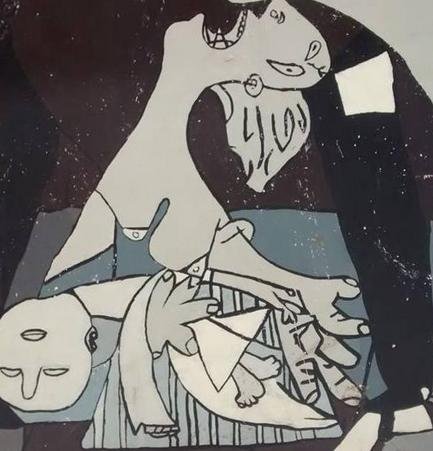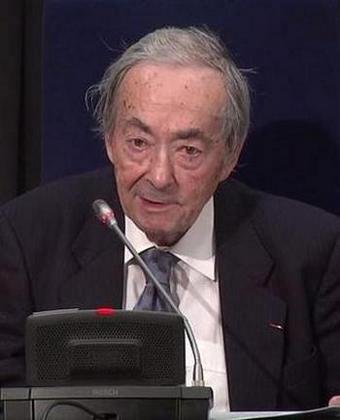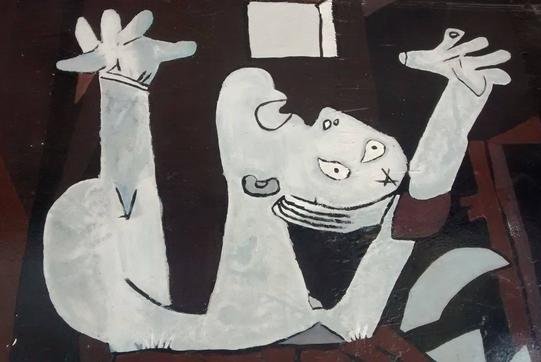ADSactly Philosophy - Creation and rebelliousness

Creation and rebelliousness
Readers, I bring to your consideration a subject of permanent validity, in my opinion. It has been raised since very distant times and in ours it conserves equal, or more, pertinence. The title of the post synthesizes it in a phrase that can resonate in our ears: creation and rebelliousness.
Although it always arises in my conscience, it came back to me when I came across a phrase that I had underlined in a book by a very appreciated author, whom I have followed in great part of his intellectual production: George Steiner. I will quote his phrase and tell you a little about it, as necessary, in order to continue reflecting on the subject.
And somewhere, a rebel singer or a philosopher inebriated with solitude will say "no." A syllable containing the promise of creation.
George Steiner. The poetry of thought

George Steiner (Paris, 1929) is an author of great relevance in contemporary thought. His prolific work deals with fundamental issues of philosophy, art, literature, history, among other aspects. Among his books I can cite (with the year of original edition, although, in my case, I read them in later editions in Spanish): The death of tragedy (1961), Language and Silence (1967); Extraterritorial: Papers on Literature and the Language Revolution (1972), Nostalgia for the Absolute (1974), After Babel (1975), Heidegger (1978), Antigones (1984), Real Presences: Is There Anything in What We Say? (1989), Grammars of Creation (2001), The poetry of thought. From the Hellenism to Celan. (2011).
I am ethically obliged to say that Steiner has been, as an adult, one of my intellectual parents, but, beyond my personal relationship with his work, this one, as is publicly acknowledged, "has exerted an important influence on the intellectual discourse of the last fifty years".

The quoted expression of Steiner, which closes his book The poetry of thought, wisely condenses the question I want to propose or introduce briefly in this post, aware that it is a matter of extensive treatment because of its complexity.
Steiner synthesizes the central sense that the artist would assume as rebellion with the use of NO, and this gesture would be the augury ("promise") of the generation of a creative work. Negation has been understood in several philosophical visions as a way of exerting the opposite attitude to something, and, to that extent, in some cases, the proposal of something different.
Steiner starts from the consideration that in contemporary times there has been an accommodation or indolence in front of the reality that has been dominating life in its different dimensions, and art, in many cases, has given in to it. It demands the updating of this rebellious sense of thought, art and literature. "NO" is that sense.

Re-encountering Steiner's approach has led me to Albert Camus, another of the main thinkers of the twentieth century, of which, unfortunately, we know little or which has been reduced to oblivion.
Albert Camus in The Rebel Man, published in 1951, had said: "In art, rebellion ends and is perpetuated in true creation. In this Camus anticipates Steiner, which is not difficult to happen in thought. This phrase is not insignificant. The manifestation to be artistically rebellious would have to be creative, that is, non-repetitive, transgressor, generator of new or critical interpretations or relations, propositive, authentic...
He also affirmed: "Every creation denies, in itself, the world of the master and the slave. It would not only be about opposition to certain opprobial situations and attitudes, be they governments or despotic societies. His proposal is more profound: Both the consciousness or culture of master and slave, which are mutually produced and reinforced, for Camus can only die and be transfigured, as he notes, at the level of creation. And for this he relies on an idea expressed by Nietzsche: "Instead of the judge and the oppressor, the creator". Artistic creation, as an expression of freedom and liberation, would negate any attitude and conscience of degrading as a victimizer or victim.

Perhaps the above idea leads him to formulate: "Today to create is to create dangerously". The novelist and philosopher thinks that taking on creation in contemporary times involves risks. Although he said it in very difficult years (the exit from Nazi horror, the threats of Stalinism and Maccarthism, etc.), his reflection surpasses that specific historical reality, and involves us today. It could be understood as the risks inherent in artistic creation in terms of its demands, but also as the danger that would threaten it in the face of state or other power (there are many historical cases in the past, such as the judicial processes against Flaubert, Baudelaire or Wilde in the 19th century, or the persecution, imprisonment or sentencing of Ósip Mandelstam, Salman Rushdie or Reinaldo Arenas in the 20th century).
A last quotation from Camus in the above-mentioned book:
Ernest Dwinger in his Siberian Diary speaks of this German lieutenant who, imprisoned for years in a concentration camp where cold and hunger reigned, had built a silent piano with wooden keys. There, in the pile of misery, in the middle of a multitude of rags, he composed a strange music that only he could hear. Thus, thrown into hell, mysterious melodies and the cruel images of escaped beauty would always bring us, in the midst of crime and madness, the echo of that harmonious insurrection that testifies to human greatness over the centuries.
I appreciate in this anecdote referred to by Camus and in his commentary the condensation of that rebellion (insurrection, in the translation I possess) of art, which, touched by a "terrible humility", is capable of accompanying loneliness in the face of power, resisting the greatest opprobrium and overcoming it in the spiritual and moral dimension of man.
Bibliographic references
Camus, Albert (1978). The rebellious man. Argentina: Editorial Losada.
Steiner, George (2012). The Poetry of Thought. From Hellenism to Celan. Mexico: Economic Culture Fund - Siruela. - Siruela.
Grateful for his reading and attention.
Written by @josemalavem
Click on the coin to join our Discord Chat

Witness proposal is here:
Go To Steem Witness Page
In the bottom of the page type: adsactly-witness and press vote.

Use small letters and no "@" sign. Or, click here to vote directly!
Thank you!
As a reader I just want to say that every writers has many experience which support them to creat their works. I see that one of motivation when they wrote was a rebellion.
Every soul rebellion will give birth to new powers that can create a monumental work. This thinking is based on writers who want to hit their confines so that they create new works that are outside the mainstream. Usually solitude and loneliness can also be a driving force for the birth of contemplative works. And I saw Camus doing that. Deep recitation with his inner experience is able to encourage him to produce great works with deep thought and contemplation. We now see those works from the great poets.
Thank you @josemalavem
Thank you @adsactly
Thank you Steemit
Warm regard from Indonesia
Thanks for your comment, @rokhani, always attentive and pondered. I like the expression you used: "rebellion of the soul", is what we can use properly from romanticism to our days. I share with you that in every great writer an inner rebellion is forged that drives and feeds his creative work. Camus is a perfect example. Apart from his philosophical essay books, his excellent novels The foreigner and The pest, there is one (which I do not know if you have read), published after his death, which is an extraordinary work of narrative: The first man . Greetings.
There is no creation without rebellion. Every new thing created by man starts from the refusal to accept what is done, to get used to what is imposed. I stop before the tragic but beautiful anecdote of Camus and that you quote here: the human being can create a world where he can live, isolate himself and be happy, far from where his body is. For it is not where the artist's body is, but where his soul is! If we conform or accept what is in our environment, we will not only be detained as a species, but we will have died without yet being so. As always, excellent work, @josemalavem.
finally read your philosophy content brother.
Hi, @adsactly!
You just got a 0.47% upvote from SteemPlus!
To get higher upvotes, earn more SteemPlus Points (SPP). On your Steemit wallet, check your SPP balance and click on "How to earn SPP?" to find out all the ways to earn.
If you're not using SteemPlus yet, please check our last posts in here to see the many ways in which SteemPlus can improve your Steem experience on Steemit and Busy.
Hey, hope you are having a nice day!
We stopped by to invite you to participate in the "B&W Photography contest", "'Dream' -- 100 words free writing contest", and "Food Photography #2 contest", and win prizes worth 18 Steem!
Try 1Ramp Android or Web to easily participate in the contests or host your own.
Cheers!